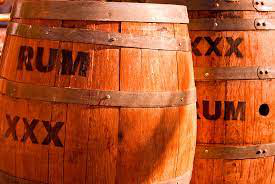R is for … Rum
 Given the Caribbean theme, today's subject for the Food Alphabetical shouldn't have been too hard to guess. In Barbados, where we visited before Christmas, rum is still a very important part of the Bajan economy. Although rum is now made world wide, many connoisseurs still believe that the finest stuff comes from the West Indies. Barbados is home to some of the best known rum distilleries including Mount Gay, Four Square and St Nicholas.
Given the Caribbean theme, today's subject for the Food Alphabetical shouldn't have been too hard to guess. In Barbados, where we visited before Christmas, rum is still a very important part of the Bajan economy. Although rum is now made world wide, many connoisseurs still believe that the finest stuff comes from the West Indies. Barbados is home to some of the best known rum distilleries including Mount Gay, Four Square and St Nicholas.
In this column I often indulge in a little history. With rum, a lot of it (including even the name) is so obscure that it's not that interesting. You make the stuff from either sugar syrup, released when you crush the canes, or molasses (treacle). It is speculated that the technique came to Barbados from Brazil. There is a strong possibility that slaves and "indentured servants" - the latter often Scots or Irish - started making it with hidden stills.
It is certain that the plantation owners were quick to spot its potential. At least one sugar farmer, by making rum from a small part of his crop, covered all of his overheads, meaning his sugar business ran with a 100% profit margin. The British Navy and rum have a long association. What is less well known is the early American connection. George Washington visited Barbados as a 19 year old. He acquired a taste for the stuff and insisted on a barrel of finest Barbadian rum at his inauguration in 1789. By then rum was hugely popular in the so called Thirteen Colonies. The first rum distillery was established on Staten Island, NY in 1664. It is estimated that by the time of the American Revolution consumption in the colony was about 14 litres a year for every man, woman and child.
The British association with rum began with the capture of Jamaica in 1655. It had long been the naval practice to issue a daily tot of liquor to every man. Local rum was a lot cheaper than brandy, and more easily available. Navy rum was ferociously strong stuff, so it was watered down, and known as grog.
In the West Indies, rum is sometimes referred to as Nelson's blood. After the admiral's death at the Battle of Trafalgar his body was preserved in a barrel of rum for transportation back to Britain for burial. On arrival the cask was found to contain only a pickled corpse, but no liquid. On investigation it was discovered that the sailors had drilled a hole in the bottom and scoffed all the liquor. Believe it if you will.
The Royal Navy ended the practice of issuing a daily tot in 1970. Prior to this, the order to splice the mainbrace would have resulted in a double ration. Today the order may still be given by the King as commander-in-chief, or by the Admiralty Board.
From the 1960s light or "white" rum grew in popularity, particularly in mixed drinks. The golden stuff is enjoying a resurgence. For at least five years predictions have been made that it will surpass gin in popularity. I've yet to see that but with an annual market estimated at US$ 17.4 billion it's not doing too badly.
So what is the meaning and derivation of a “rum deal”?
A couple of possibilities. The use of “rum” as in a rum cove, ie a great rogue, has been in use since about 1800. (Source OED). Bizarrely, a very old definition of rum, now disused, is great, excellent, ie the complete opposite.
I think your phrase comes from the days of bootlegging during Prohibition in the USA. Bootleggers were generally known as rum runners, hardly known for their honesty. By contrast there was a bootlegger of Scottish origin, name of McCoy. While many bootleggers would pass off moonshine with fake labels as genuine, McCoy dealt mainly in genuine Cutty Sark Scotch whisky. If you were selling stuff on to a doubtful customer, you could calm them down by telling them it was the real McCoy.
Superb! Possibly food has enriched our language as much as other areas such as seafaring.
Without stopping to think, so many examples occur. Eating humble pie, getting the cold shoulder, proof of the pudding. (the latter makes little sense, but hey ho.) You may have given me the idea for another article.